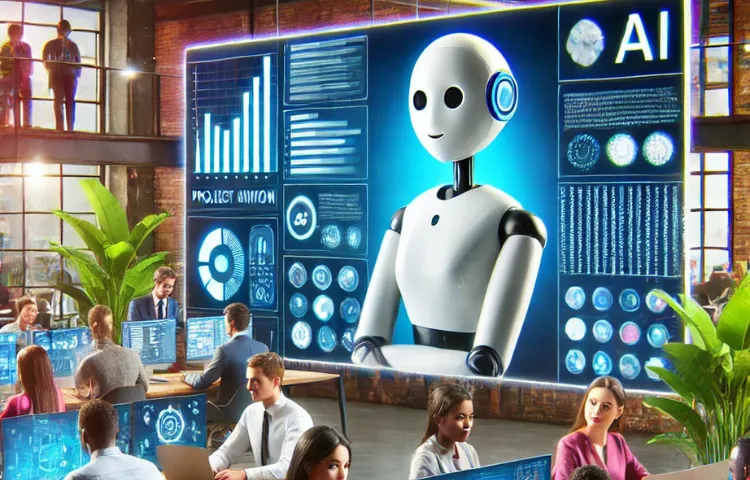

Prefer to listen instead? Here’s the podcast version of this article.
Artificial Intelligence (AI) has moved beyond the realm of future tech dreams and is now revolutionizing everyday workflows. From managing emails to enhancing collaboration, AI’s ability to automate routine tasks and provide strategic insights is empowering organizations to work smarter, not harder. In this blog, we dive into how AI is reshaping workplace productivity, making workflows more efficient, and even redefining the roles we play at work.
AI-driven tools are stepping up to handle repetitive, time-consuming tasks, allowing employees to focus on higher-value activities. For instance, AI-powered project management software like Asana uses predictive algorithms to set priorities and identify risks in real-time, optimizing task management. Similarly, Fireflies.ai captures meeting notes automatically, generating summaries that free employees from the distraction of taking notes.
Another example is AI-enhanced email management tools like Mailbutler, which prioritize urgent messages, categorize incoming emails, and draft responses for review. These tools improve communication flow, prevent information overload, and ensure that workers never miss critical tasks.
The result? Teams can save hours of mundane labor each week, redirecting that energy toward strategic projects that require human ingenuity.
Beyond task automation, AI tools are increasingly participating in strategic decision-making processes. Using machine learning algorithms, platforms analyze vast datasets to spot trends, forecast outcomes, and suggest optimal business strategies. Companies leverage AI for predictive analytics in areas like revenue forecasting, customer churn analysis, and supply chain optimization.
For instance, AI-powered platforms can alert managers to potential bottlenecks before they disrupt a project or suggest market opportunities hidden in big data. This blend of human intuition and AI-based insights helps businesses make data-driven decisions with confidence, increasing efficiency and reducing risks.
Another trend shaping everyday workflows is the adoption of smaller, optimized AI models. These compact models can run locally on personal devices like smartphones, addressing privacy concerns and reducing dependency on cloud infrastructure. Running AI models on the edge—such as in Internet of Things (IoT) devices—means businesses can deploy AI solutions without incurring massive cloud-computing expenses.
This democratization of AI ensures that even small businesses and startups can integrate advanced AI tools into their workflows. With tools like IBM’s WatsonX and Quantilus AI Solutions, companies can now access tailor-made AI models to handle everything from customer service to supply chain analytics.
AI is not just transforming tasks—it’s reshaping the job market. While some roles are becoming obsolete, others are emerging to fill new needs. Prompt engineers, AI trainers, and ethicists are just a few of the new professions coming to the fore. At the same time, employees across industries are upskilling to remain relevant in an AI-powered world.
The key to thriving in this evolving landscape lies in adopting a mindset of continuous learning. Professionals who embrace AI-powered learning tools and upskilling platforms—like those highlighted in this AI Career Trends blog—will find themselves well-positioned to capitalize on the opportunities created by AI technologies.
As AI becomes integral to everyday work, ethical concerns around data privacy, bias, and transparency have come to the forefront. Governments and organizations are working to implement regulations, such as the European Union’s AI Act, to ensure the ethical use of AI in business. Transparent, accountable AI practices are essential for building trust between organizations, employees, and customers.
Companies that prioritize ethical AI adoption—through measures like explainable models and transparent data policies—will not only mitigate risks but also foster a culture of responsible innovation.
AI-powered tools are no longer futuristic concepts; they are becoming a core part of everyday workflows. As companies integrate these tools into their operations, they are witnessing increases in productivity, efficiency, and innovation. However, staying ahead requires more than just adopting the latest tools—it demands a commitment to continuous learning, ethical practices, and strategic adaptation.
Curious about how AI can benefit your business? Explore more insights on AI and business transformation in the Quantilus Blog. Staying informed will ensure you’re ready to harness the full potential of AI in your daily workflows.
WEBINAR